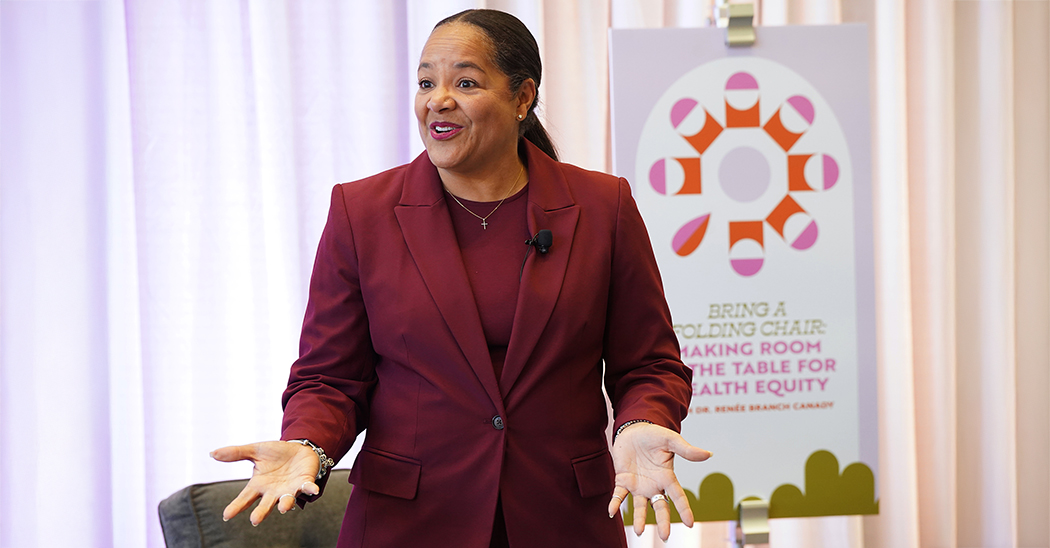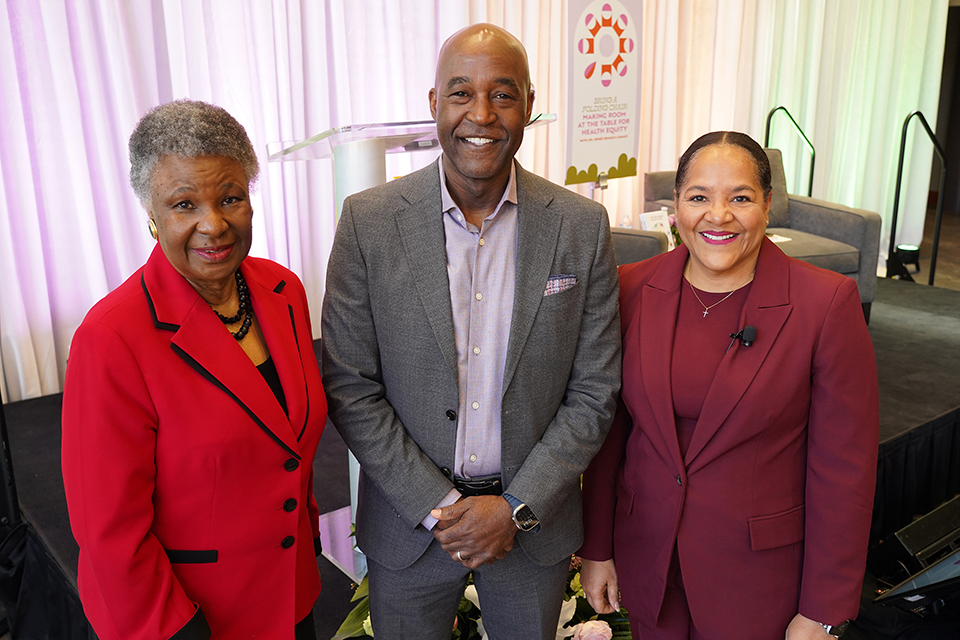Canady: ‘A just world is healthier tomorrow than it is today for all’

National public health thought leader states case for making room at the table for everyone
ANN ARBOR—Renée Branch Canady, known for her eloquence and passion for public health, delivered a heartfelt message of hope amid challenging times on April 1 at the University of Michigan School of Public Health’s Cornely Community Room.
The talk, “Bring a Folding Chair: Making Room at the Table for Health Equity," was a fitting reminder of how pivotal health equity is within the work and lives of the public health community.
“Being silenced is not acceptable, and inaction can be as bad as the wrong action,” said Canady, the CEO of the Michigan Public Health Institute (MPHI). “You have to continue to provide care to ensure the conditions necessary for good health for all.
“Words matter, but work matters more. At MPHI, our vision is a just world where tomorrow is healthier than today for all—poor, rich, brown, white, men and women.”
Canady is recognized as a national thought leader in the areas of health inequities and disparities, cultural competence and social justice. She recently published the book “Room at the Table: A Leader’s Guide to Advancing Health Equity and Justice.”
Prior to joining MPHI, Canady served as health officer and director of the Ingham County Health Department in Lansing. She also has held faculty and administrative positions in the College of Nursing and C.S. Mott Department of Public Health at Michigan State University.
Health equity is, in my mind, non-negotiable—it’s a cornerstone, really, to everything that we do.”
— Renée Branch Canady
Canady passionately advocates for health equity as an essential pillar of public health, emphasizing its vital importance in addressing the unique challenges and disparities faced by various populations.
“Health equity is, in my mind, non-negotiable—it’s a cornerstone, really, to everything that we do,” she said.
In the realm of public health, equity denotes fairness and justice in healthcare access, treatment and outcomes, aiming to eliminate disparities that stem from socio-economic status, race or other socio-cultural factors.
She stressed that public health’s primary mission is to serve communities by recognizing and respecting their diverse experiences and needs.
“Our field is about working to support communities, and we can’t properly serve communities if we don’t recognize that different populations have different experiences that lead to different health outcomes,” Canady said.
This necessitates a commitment to co-creating solutions with those communities, she said, rather than imposing top-down interventions. In addition, Canady champions the role of leadership at all levels in advocating for health equity.
“All of us have the ability to be leaders,” she said. “Leadership happens at every level of an organization.”
By harnessing the collective strength and voices within public health, professionals can drive systemic change to ensure that health equity is realized as a foundational reality, not just an aspirational goal.
Canady’s call to action is for public health leaders to engage with critical thinking, sustained commitment and a strategic approach that bridges relationships across divides to foster inclusive, equitable health practices for all.
“It's not about the position; it’s about the positioning,” she said.
After Canady’s talk, she was joined by Cleo Caldwell, professor emerita of Health Behavior & Health Equity at Michigan Public Health, for a Q&A session about “Room at the Table.”
As a social psychologist with expertise in psychosocial and environmental factors influencing the health and well-being of Black populations, Caldwell’s research includes both intervention and basic research involving survey research techniques with adults, adolescents and families. She also has expertise in conducting community-based participatory research (CBPR), developing academic-community partnerships to design and evaluate health interventions for Black youth and their family.

On self-reflection
Caldwell: Dr. Canady, you state in your book that everyone who has read it is privileged; regardless of who you say you are, you have some level of privilege. How does self-reflection play into the equity process, especially for those who see themselves as fair and compassionate and don’t recognize their biases?
Canady: Equity leadership is about putting the needs of others before your own. When I started in community organizing, they asked for my self-interest. I thought I was here for others. But they told me that putting others first is indeed self-interest. It’s about listening and understanding those you’re trying to help.
We look for quick fixes to deepen relationships. True respect is knowing what is respectful to others. Understanding the lived experiences of diverse individuals helps unity. Discussions need openness to truly mean equity.
On facilitated dialogue
Caldwell: You suggest facilitated dialogue can help achieve health equity. How do you include resistors at the table, especially if they’re not interested?
Canady: Build relationships across differences; make a friend who challenges your views. Authentic relationships welcome dialogue. Open posing questions—rather than interrogating—can facilitate conversations. These times are about engaging, not about attacks. Dialogue and conversations can plant seeds of understanding. True dialogue keeps hearts open and connected.
On socialization and equity
Caldwell: You state in the book that we aren’t naturally socialized to think about equity. What helped shift your perspective early in your career?
Canady: Growing up in a military family, encountering diversity was inescapable. Moving frequently meant I was often the minority, which fueled my empathy for diverse perspectives and drove me to advocate for equity. Early experiences of exclusion made me recognize the importance of considering others’ distinct needs. I want us to see through eyes of compassion, not condemnation.
Encouragement for speaking up
Caldwell: Often women, minorities or less-powerful individuals get silenced. How do you encourage others to find their voice?
Canady: Dr. Martin Luther King Jr. said, “There’s always the right time to do what’s right,” but I argue timing is as critical as the message. Strategically find ways to speak truth in a manner that invites dialogue rather than ostracism. Offer respect-filled feedback; describe personal impacts. Each voice added to dissent matters. Students’ voices drove the lunch counter sit-ins; youth powers change.
On action and engagement
Caldwell: Doing nothing is doing something. How do we engage in productive outrage productively and disrupt positively?
Canady: We’re trained to be cognitive, but what do you think and feel? Feelings drive true change. We can’t intellectualize away issues. It’s about heartfelt engagement. Authenticity drives people to act. Every day choose courage; you’re positioned for purpose. Apply knowledge with compassion; connect thought to heartfelt action.
